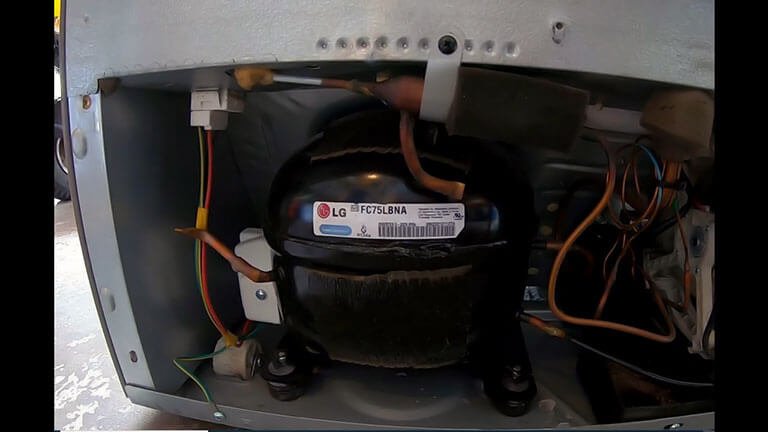LG Compressor Problems: Quick Fixes & Expert Tips
Common LG compressor problems include insufficient cooling, strange noises, and frequent cycling. These issues often stem from electrical faults, refrigerant leaks, or mechanical failures.
LG compressors are essential for maintaining optimal cooling in refrigerators and air conditioning units. When these components malfunction, they can lead to discomfort and food spoilage. Recognizing the signs of compressor issues is crucial for timely repairs. Users may notice inconsistent temperatures or hear unusual sounds, signaling potential problems.
Understanding these issues can save time and money in the long run. Regular maintenance and prompt attention to any irregularities can enhance performance and prolong the lifespan of your appliance. Stay informed about common compressor problems to ensure your LG unit operates efficiently.
Common Lg Compressor Issues

LG compressors are vital for cooling appliances. They can face several problems over time. Understanding these issues helps in quick detection and resolution.
Symptoms Of Failure
Identifying compressor problems early is crucial. Look for these symptoms:
- Unusual Noises: Clicking or buzzing sounds.
- Increased Energy Bills: Higher costs indicate inefficiency.
- Inconsistent Cooling: Areas of your space feel warm.
- Frequent Cycling: Compressor turns on and off often.
- Overheating: Compressor feels hot to the touch.
Frequency Of Occurrence
Some issues happen more often than others. Here’s a table of common problems:
| Issue | Frequency |
|---|---|
| Compressor Overload | High |
| Electrical Failures | Medium |
| Refrigerant Leaks | Medium |
| Mechanical Failures | Low |
Regular maintenance reduces these problems. Keep your LG compressor running smoothly.
Initial Troubleshooting Steps
When facing issues with your LG compressor, start with basic troubleshooting steps. Quick actions can help identify problems early. Follow these steps to save time and money.
Safety Precautions
- Always turn off the power supply.
- Wear safety gloves and goggles.
- Ensure the area is dry to prevent electrical shocks.
- Keep children and pets away from the work area.
Taking these safety measures is crucial. Protecting yourself prevents accidents and injuries.
Basic Diagnostic Procedures
- Check the power source. Ensure the unit is plugged in.
- Inspect the circuit breaker. Look for tripped breakers.
- Listen for unusual noises. Any rattling or clicking sounds?
- Feel for vibrations. Excessive vibrations indicate issues.
- Examine the compressor. Look for visible damage or leaks.
Following these diagnostic procedures helps pinpoint the issue. Each step brings you closer to a solution.
| Issue | Possible Cause | Solution |
|---|---|---|
| No power | Disconnected plug or tripped breaker | Reconnect or reset the breaker |
| Unusual noise | Loose components or internal damage | Tighten or replace parts |
| Excessive vibrations | Unbalanced installation or worn parts | Reinstall or replace parts |
| Leaks | Damaged seals or connections | Seal or replace damaged components |
Refer to this table for quick reference. Addressing these issues early can enhance your compressor’s performance.
Quick Fixes For Minor Issues
Minor problems with your LG compressor can often be fixed quickly. Below are some easy solutions that can save time and money. These quick fixes can help keep your system running smoothly.
Resetting The Compressor
Sometimes, your LG compressor may simply need a reset. This process is easy and can solve many minor issues. Here’s how to do it:
- Locate the power cord of your compressor.
- Unplug the power cord from the outlet.
- Wait for at least 5 minutes.
- Plug the power cord back into the outlet.
- Turn on your compressor.
Resetting the compressor allows the system to reboot. This can fix problems like improper cooling or strange noises.
Cleaning Coils And Filters
Dirty coils and filters can hinder your compressor’s performance. Regular cleaning improves efficiency. Follow these steps:
| Item | Cleaning Method |
|---|---|
| Coils | Use a soft brush or cloth to remove dirt. |
| Filters | Wash filters with warm, soapy water and dry them. |
Cleaning should be done every 3 months. This keeps your compressor running efficiently. Clean parts also extend the lifespan of your unit.
Expert Tips For Compressor Maintenance
Maintaining your LG compressor is vital for its longevity and efficiency. Regular care can prevent major issues and save on repair costs. Here are some expert tips to keep your compressor running smoothly.
Regular Maintenance Schedule
Establishing a regular maintenance schedule helps avoid compressor problems. Follow these steps for effective upkeep:
- Check the Filters: Clean or replace filters every 1-3 months.
- Inspect the Coils: Clean condenser and evaporator coils biannually.
- Listen for Unusual Noises: Address strange sounds immediately.
- Monitor Temperature: Ensure your compressor maintains the correct temperature.
Setting reminders on your calendar can help stay on track. Regular maintenance prevents dirt buildup and improves efficiency.
Professional Inspection Recommendations
Professional inspections are crucial for compressor health. Here are some tips:
- Schedule Annual Check-ups: Book a professional inspection once a year.
- Use Qualified Technicians: Choose certified technicians with experience in LG compressors.
- Request Detailed Reports: Ask for a complete report on the compressor’s condition.
- Follow Up on Recommendations: Address any issues found during inspections.
Regular professional inspections catch problems early. This proactive approach saves time and money on repairs.
Dealing With Compressor Noise
Compressor noise can be annoying. It often signals a problem. Understanding the sounds helps in finding solutions. Here’s how to deal with it effectively.
Identifying Unusual Sounds
Listen for specific sounds coming from your LG compressor. Each sound can indicate different issues. Here are common noises:
- Buzzing: May indicate electrical issues.
- Clanking: Could mean loose parts.
- Hissing: Might suggest refrigerant leaks.
- Screeching: Often points to worn bearings.
Keep a log of these sounds. Record when they occur. This information helps technicians diagnose problems quickly.
Mitigation Techniques
Reducing compressor noise improves comfort. Here are effective techniques:
- Check Mounting: Ensure the compressor is securely mounted.
- Insulate: Use soundproofing materials around the compressor.
- Regular Maintenance: Schedule routine inspections.
- Replace Worn Parts: Change any damaged components promptly.
| Sound | Possible Cause | Solution |
|---|---|---|
| Buzzing | Electrical issues | Inspect wiring and connections |
| Clanking | Loose parts | Tighten or replace parts |
| Hissing | Refrigerant leaks | Call a technician |
| Screeching | Worn bearings | Lubricate or replace bearings |
Addressing these issues early helps avoid costly repairs. Stay proactive with your LG compressor.
Replacing Lg Compressor Parts
Replacing LG compressor parts can restore your appliance’s efficiency. Identifying worn components is key. A successful replacement ensures your system runs smoothly.
Identifying Worn Components
Check these common parts for wear:
- Compressor Motor: Listen for unusual noises.
- Start Relay: Look for signs of overheating.
- Capacitor: Check for bulging or leaking.
- Condenser Coils: Inspect for dirt and debris.
Use this simple table to track your findings:
| Component | Signs of Wear |
|---|---|
| Compressor Motor | Unusual noises |
| Start Relay | Overheating |
| Capacitor | Bulging or leaking |
| Condenser Coils | Dirt and debris |
Step-by-step Replacement Guide
Follow these steps to replace LG compressor parts:
- Turn off the power: Disconnect the appliance from the power source.
- Remove the cover: Use a screwdriver to take off the compressor cover.
- Disconnect the wires: Label and disconnect the electrical connections.
- Remove the faulty part: Unscrew and take out the worn component.
- Install the new part: Place the new component in position.
- Reconnect the wires: Follow the labels to ensure proper connections.
- Replace the cover: Screw the cover back on securely.
- Restore power: Plug the appliance back in and test it.
Always follow safety precautions. Wear gloves and safety glasses. Proper installation can enhance your LG appliance’s lifespan.
When To Call A Professional
Recognizing when to seek help for your LG compressor problems is vital. Some issues can be fixed easily. Others require professional expertise. Knowing the difference can save time and money.
Complex Issues Requiring Expertise
Some compressor problems are not simple fixes. Here are signs that indicate you need a professional:
- Constant Noises: Loud or unusual sounds from the unit.
- Frequent Cycling: The compressor turns on and off too often.
- Inconsistent Cooling: Rooms are not cooling evenly.
- Leaking Refrigerant: Visible leaks around the compressor.
These issues often require specialized knowledge. A professional can diagnose and repair them effectively.
Finding Qualified Technicians
Choosing the right technician is crucial. Here are tips to find a qualified expert:
- Check Reviews: Look for positive customer feedback online.
- Verify Credentials: Ensure they have proper licenses and certifications.
- Ask for Estimates: Get written quotes before agreeing to services.
- Inquire About Experience: Choose someone with experience in LG compressors.
Taking these steps will help you find a reliable technician. A professional will ensure your compressor runs smoothly.
Extending The Life Of Your Lg Compressor
Maintaining your LG compressor can greatly enhance its lifespan. Regular care prevents issues and saves money. Simple steps ensure your unit runs smoothly for years.
Long-term Care Tips
- Regular Cleaning: Dust and dirt can block airflow. Clean the exterior often.
- Check Filters: Dirty filters reduce efficiency. Replace or clean them every month.
- Monitor Temperature: Keep the compressor at optimal temperatures. Extreme heat can cause damage.
- Inspect for Leaks: Look for refrigerant leaks. Early detection prevents bigger problems.
- Schedule Maintenance: Hire a professional for yearly check-ups. They can spot issues you might miss.
Upgrade Options
Sometimes, upgrading parts can enhance performance. Consider these options:
| Upgrade | Benefits |
|---|---|
| High-Efficiency Compressor | Saves energy and reduces bills. |
| Smart Thermostat | Improves temperature control and comfort. |
| Variable-Speed Motors | Enhances efficiency and reduces noise. |
Upgrading can offer better performance. Choose options that fit your needs.
Frequently Asked Questions
What Are Common Lg Compressor Issues?
Common issues include overheating, unusual noises, and failure to cool effectively.
How To Identify A Faulty Lg Compressor?
Signs of a faulty compressor include inconsistent cooling and frequent cycling on and off.
Can I Fix My Lg Compressor Myself?
Minor issues can be fixed, but major repairs should be handled by a professional technician.
Why Is My Lg Compressor So Noisy?
Noisy compressors may indicate loose parts, debris, or internal mechanical problems that need inspection.
How To Maintain My Lg Compressor?
Regular cleaning, checking refrigerant levels, and scheduling professional maintenance can enhance compressor performance.
Conclusion
Understanding LG compressor problems is essential for maintaining your appliance’s efficiency. Regular maintenance can prevent many common issues. If you notice unusual sounds or cooling inconsistencies, it’s time to investigate. Addressing these problems early can save you time and money.
Keep your LG compressor running smoothly for optimal performance.






